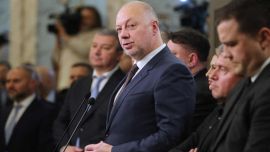Argentina’s lower house approved the privatisation of some public companies together with other key chapters of President Javier Milei’s omnibus bill in a win for the libertarian leader who had seen his first attempt to pass reforms fail in Congress nearly three months ago.
National deputies on Tuesday agreed Milei should have expanded executive powers on administrative, financial, economic and energy matters, as well as the ability to dissolve dozens of special-purpose federal government funds — two key points of his original bill that had been voted down in February. They also allowed the privatisation of nearly a dozen firms, including airline Aerolíneas Argentinas, public utilities, train and postal service companies.
In February, lawmakers rejected Milei’s proposals on energy powers and killing the funds. This time around, he was able to negotiate support for both and withdrew a proposal on security that had also been nixed — a signal of his growing pragmatism.
After every one of its dozens of chapters was approved individually, the 232-article package was sent to the Senate, where it faces its toughest battle yet. The upper house, in which Milei’s nascent La Libertad Avanza party holds only seven of 72 seats, delivered a harsh blow to the president by rejecting his signature executive decree in March.
If successful, Milei will have more power to fire state workers, cut expensive subsidies and eliminate costly government bodies to balance the country’s budget — and prove to investors his political prowess.
“This is a first fundamental step to remove Argentina from the swamp it has been the last decades,” the president wrote on X after the vote.
Milei also won approval for a labour reform that he considers essential to encourage companies to hire. The proposal would extend the trial period before a worker is hired with a full-time contract and eliminate penalties for companies trying to register informal employers, who make up about half of the work force.
With the help of his sister Karina — a top adviser whom the president refers to as “the boss” — and Interior Minister Guillermo Francos, Milei was able to successfully navigate an opposition-controlled Congress. With only 15 percent of seats in the lower house Chamber of Deputies, he built bridges with the pro-business PRO party and more moderate members of two other political groups — Unión Cívica Radical and Hacemos por Nuestro Pais — to push through his signature bill.
To get this far, he had to make important concessions, such as removing security issues from his broader powers. In the bill’s original form, Milei tried to privatise 41 companies, including oil giant YPF SA. The bill now has just over 200 articles, a significant scale-back from over 600 in its first iteration.
Milei first introduced the omnibus bill in December. As negotiations started, he gradually stripped the legislation of its most controversial tax increases and privatisations. Yet lawmakers still rejected key articles of the proposal when it first went to a vote, leading the president — directly from Israel, where he was on an official trip — to order his party to pull it back from the floor of the lower house.
In an event at the Buenos Aires Stock Exchange Monday evening as a floor debate dragged on in congress, Economy Minister Luis Caputo said the bill was important for local business leaders, investors abroad and to lessen the harshness of Milei’s budget cuts for everyday Argentines, but maintained its fate wouldn’t impact his economic plan.
“It’s not, however, a condition for fiscal austerity,” Caputo said. “We won’t ever give up that commitment.”
by Manuela Tobias, Bloomberg




















Comments